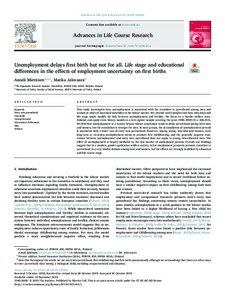Unemployment delays first birth but not for all. Life stage and educational differences in the effects of employment uncertainty on first births.
Jalovaara Marika; Miettinen Anneli
https://urn.fi/URN:NBN:fi-fe2021042821314
Tiivistelmä
This study investigates how unemployment is associated with the transition to parenthood among men and women in times of increased instability in the labour market. We provide novel insights into how education and life stage might modify the link between unemployment and fertility. We focus on a Nordic welfare state, Finland, and apply event history models to a rich register sample covering the years 1988–2009 (N = 306,413). We find that unemployment or a weaker labour market attachment tends to delay parenthood among both men and women, but the association is stronger for men. In most groups, the accumulation of unemployment periods is associated with a lower rate of entry into parenthood. However, among young, low-educated women, even long-term or recurring unemployment seems to promote first childbearing, and the generally negative association between unemployment and entry into parenthood does not apply to young, low-educated men. The effect of unemployment is largely mediated by the low income of unemployed persons. Overall, our findings suggest that in a modern, gender-egalitarian welfare society, better employment prospects promote transition to parenthood in a very similar fashion among men and women, but the effects are strongly modified by education and life course stage.
Kokoelmat
- Rinnakkaistallenteet [19207]
